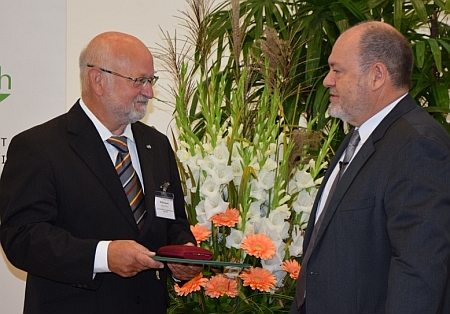You are here:
Commemorative medal for BfR Vice-President
35/2017, 27.09.2017
Society of German Chemists recognises achievements in the field of authenticity research
On the occasion of the festive meeting of the German Food Chemists’ conference in Würzburg on 26 September 2017, the Society of German Chemists awarded the Joseph-König commemorative medal to the Vice-President of the German Federal Institute for Risk Assessment (BfR), Professor Dr. Reiner Wittkowski.

The prize acknowledges his achievements in the promotion and recognition of Food Chemistry, in particular his innovative work on establishing the authenticity of foods using modern physico-chemical methods, in the course of which he set international standards. Through his research in the field of chemical-analytical detection methods for verifying the geographic origin of foods, he is regarded as one of the founding fathers of authenticity research. This important aspect of consumer protection enjoys a high priority at the BfR, as it did at the BfR’s predecessor institutions, to ensure that cases of food fraud can be exposed.
Wittkowski ensured among other things that nuclear magnetic resonance spectroscopy was introduced to food analysis in order to verify wine, thus laying the foundations for present-day methods and analytical strategies for combating food fraud.
As the first and to-date only food chemist, he headed the intergovernmental global body “International Organisation Of Vine and Wine” (OIV) as president from 2003 to 2006 and as vice president from 2006 to 2009, making a decisive contribution towards establishing internationally binding standards in viniculture and wine production, product safety and designation, and wine marketing. 44 wine-producing and wine-consuming countries are amalgamated in the OIV. He has already received several national and international awards for his achievements.
His research work in the field of dioxin analytics at the end of the 1980s created the foundation for what has now become routine surveillance to identify these contaminants, and also formed the basis for continuous monitoring in this regard.
Today, new non-targeted methods for detecting food adulteration and the origin of foods are the focus of authenticity research at the BfR. Non-targeted means that tests are not made for a specific falsification but rather that deviations from the normal characteristics are compared with authentic samples listed in specialised databases. The analytical verification of product identity and the traceability of foods constitute a fundamental aspect of consumer health protection which is gaining more and more significance through the intensification of global trade.
About the BfR
The German Federal Institute for Risk Assessment (BfR) is a scientifically independent institution within the portfolio of the Federal Ministry of Food and Agriculture (BMEL) in Germany. It advises the Federal Government and Federal Laender on questions of food, chemical and product safety. The BfR conducts its own research on topics that are closely linked to its assessment tasks.
The BfR is celebrating its 15th anniversary this year. To mark the occasion, the institute has published a jubilee brochure (in German) which can be downloaded or ordered free of charge at http://www.bfr.bund.de/en/publication/brochures-61045.html.
This text version is a translation of the original German text which is the only legally binding version.
